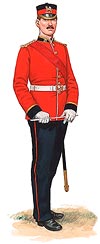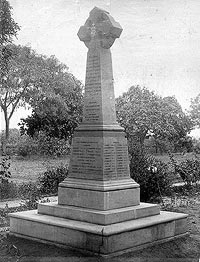Subsequent Tours - A Kipling Connection?
 |
| Bandmaster,
2nd Bn The Queen's Royal (West Surrey)
Regiment. 1881
(After Cardwell Reforms, India). (Click to enlarge) |
Nevertheless shipboard conditions had become far better for soldiers and their families, and the opening of the Suez Canal made it far easier to take home leave and to bring wives and children out to India. There was, however, no significant reduction in the length of tours of battalions posted to India where the developing railway system facilitated both the more rapid contingency deployment of units within India and greater use of the healthier stations for British troops. 2nd Queen’s did not leave until 1894. They were there in 1876 when Queen Victoria was declared Empress of India and the Governor-General became her Viceroy. Their tour also included three years in Burma which was regarded as a province of India.
 |
| Memorial erected by 1st Bn The East Surrey Regiment in memory of members of the Regiment who died in a cholera epidemic, Allahabad 1887 - 1889. (Click to enlarge) |
Operations in Upper Burma - the Second Burma War - found 2nd Queen’s in the 3rd Brigade based on Meiktila and Pyinmana for much of the time. Those were places which were to feature prominently in World War Two campaigns in Burma. The battalion returned to India, to Ambala, in 1888. In 1891 it was inspected by the Commander-in-Chief, Lord Roberts, who complimented the battalion on its excellence and said in his report “This is chiefly due to regimental traditions and esprit de corps, but the West Surrey territorial district furnishes unusually good material in recruits.” The battalion moved to Dinapore in late 1891 with a detached company at Shatong in Sikkim. In January 1894 it embarked at Bombay for England, and en route at Malta transferred 348 soldiers to the 1st Battalion which had recently arrived there from England.
1st Queen’s returned to India in 1895 and served there until 1908. For much of the time they were involved in the defence of the North West Frontier and the Malekand, Mohman and Tirah expeditions.
The 70th Regiment returned to India in 1871 and stayed until 1884, having become the 2nd Battalion The East Surrey Regiment in 1881. It featured prominently in the 2nd Afghan War in 1878-79. The 31st Regiment became 1st Surreys in 1881 and was back in India from 1885 to 1903. It was stationed at Allahabad from 1886 to 1889. Rudyard Kipling was on the staff of the Pioneer Newspaper there and published three books - Soldiers Three - Plain Tales from the Hills - Wee Willy Winkie. The books contained many stories about the British Army in India and about the experiences of three soldiers whom he called Privates Mulvaney, Ortheris and Learoid - The Soldiers Three. The first of his Barrack Room Ballads was published in London in 1892 after his return from India and were also based on his contacts with servicemen in India. Among them - most likely - were soldiers in the 1st Surreys.
Related
